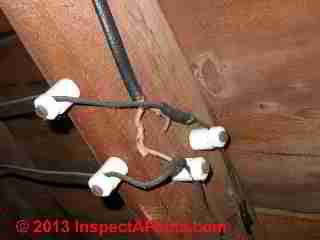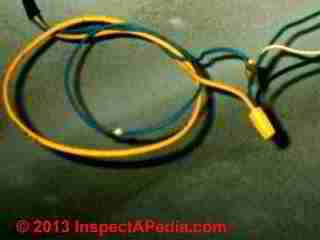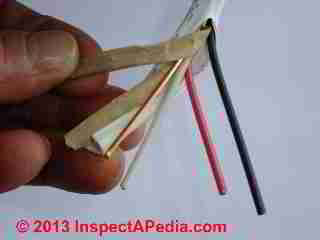 Guide to Building Electrical Wiring Color Codes
Guide to Building Electrical Wiring Color Codes
- POST a QUESTION or COMMENT about Electrical Wiring Color Codes & Conventions for 120V or 240V A/C Circuits in Buildings
Electrical wiring colour codes:
This article describes the electrical wiring color code conventions for 120V or 240V AC circuit wiring in buildings in Canada, the U.S., the U.K. and the I.E.C.
Quoting from authoritative codes & standards for each region we provide a table summarizing the current and prior wiring color code conventions used by electricians in building wiring.
For each color code table we include authority citations and links to sources of codes, books, standards and wiring guidelines.
We point out with photo-examples that while wire color code theory is nice and all that, in the real world of working on existing buildings, wires are not always reliably color-coded and colors may in fact be impossible to discern. Some of the wire color images here were adapted from data provided by the Malta Resources Authority's excellent document on Harmonisation of Wiring Colour Codes - cited below.
InspectAPedia tolerates no conflicts of interest. We have no relationship with advertisers, products, or services discussed at this website.
- Daniel Friedman, Publisher/Editor/Author - See WHO ARE WE?
Building Electrical Wiring Color Codes & Conventions for 120V or 240V A/C Circuits
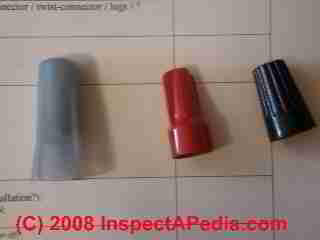 This new type NM-B 14-3 electrical wire has color coded conductors that are easy to spot and understand:
This new type NM-B 14-3 electrical wire has color coded conductors that are easy to spot and understand:
- Black - use for line voltage or "hot" wire
- Red - a second line voltage or "hot" wire
- White - neutral
- Bare - protective ground
But as we will illustrate below, on some older buildings spotting any color at all in the wiring insulation or jacket can be difficult or even impossible. Here are links to the electrical wiring color code conventions used by various countries.
Article Contents:
Notes to the table above
Wiring color code standard sources:
1. National Electrical Code 2011 (NEC) - see http://www.nfpa.org/ (adopted in all 50 U.S. states)
2. UL508A, Section 66.5.3 & 66.9
3. NFPA 79, Chapter 13 - see http://www.nfpa.org/
Some sources include red with white tracer line = switched neutral
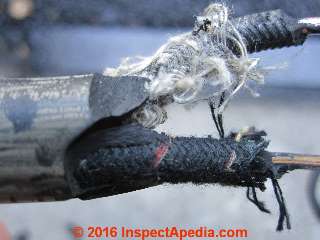
On older wiring such as this rubber and fabric-jacketed household wiring from a U.S. home, figuring out what the heck the wire colors are can itself be a challenge.
Look closely at the fabric covering of the two wiring strands in our photo.
The upper wire is the "white" or neutral wire.
The lower wire, whose fabric insulation is black with red and white tracer threads is the "black" or hot wire.
But sometimes there is no clear color distinction between the two wires: you'll need to trace the wiring and use a DMM or VOM to figure out which wire is "hot" and which is neutral or ground.
Notes to the table above
1. 2012 Canadian Electrical Code (CEC) - see http://shop.csa.ca
Mississauga Office
5060 Spectrum Way, Suite 100
Mississauga, Ontario
Canada, L4W 5N6
Toll-Free: (800) 463-6727
Tel: (416) 747-4000
Fax: (416) 747-2473
Edmonton Office
1707-94 Street North West
Edmonton, Alberta
Canada, T6N 1E6
Main: (780) 450-2111
Sales: (780) 490-2007
Fax: (780) 490-2059
This knob-and-tube electrical wiring photo has useful information for the electrician or building inspector.
First we can see that if we're in luck, the fabric portion of the wiring insulation may be intact and may clearly show that one conductor is white (neutral) and the other black (hot). With age the white insulation may have become tan or even brownish in color.
Second I'm a bit nervous about how that white wire is stripped back and is in contact with the hot black wire (arrow).
Finally, of course there is no protective ground on this circuit - we've got just two wires with which to contend.
Notes to the table above
Three Phase Wiring Colour Codes
Notes:
The U.K. currently follows the IEC AC wiring colour codes given at I.E.C. I.E.E. ELECTRICAL WIRING COLOUR CODE CHART
New wiring colour codes replaced existing red & black phase & neutral conductors (left) with brown and blue (right) beginning in 2005.
Where extensions or new work can result in mixed wiring colours, a warning must be fixed near the distribution board stating:
CAUTION: this installation has wiring colours to two versions of BS 7671. Great care should be taken before undertaking extension, alteration or repair that all conductors are correctly identified.
Regulating authority, IEC AC
I.E.E. Regulations (UK Standard BS 7671:2001) Requirements for Electrical Installations, IEE Wiring Regulations, Sixteenth Edition Amendment No. 2: AMD 14905, March 2004
"New Fixed Wiring Colours - A Practical Guide", www.nicelc.org.uk
"The IEE, ELectrician's Guide to the building regulations, including Approved Document P: Electrical Safety in Dwellings, Chapter 11"
Malta Resources Authority, "Harmonisation of Wiring Colour Codes, Practical Guidelines",
http://mra.org.mt
www.i.e.e.org/cablecolours
Three PHase Wiring Colour Codes & Colour Changes
Three phase wiring colour codes & color changes are shown just below:
Failure to Follow Wiring Colour Code Conventions
This wiring shown below: well don't even think about figuring this out by color codes. Someone has just grabbed a piece of yellow wire and a blue wire, left an open splice, and jury-rigged something (not shown in our photo).
Watch out: But when you see obviously amateur electrical--wiring like this it's a red flag to watch out, asking "what else did this fellow wire in this building?" How dangerous is it?
Note to the table above
Regulating authority, IEC AC
Table of Wire Color Code Abbreviations [1] |
||
| Color Abbreviation Code | Wire Color | Comments |
| AL | Aluminum | |
| ALL | Any Color | |
| AM | Amber | |
| AO | All Opaque | |
| AT | All Transparent | |
| BG | Beige | |
| BK | Black | |
| BL | Blue | |
| BN | Brown | |
| BZ | Bronze | |
| CH | Charcoal | |
| CL | Clear | |
| DK | Dark | |
| GD | Gold | |
| GN | Green | |
| GY | Gray | |
| GT | Granite | |
| IV | Ivory (Cream in some countries) | |
| LT | Light | |
| NC | Natural (no pigmentation) | |
| OL | Olive | |
| OP | Opaque | |
| OR | Orange | |
| PK | Pink | |
| RD | RED | |
| SM | Smoke (light gray) | |
| TL | Translucent | |
| TN | Tan | |
| TP | Transparent (clear) | |
| VT | Violet | |
| WT | White | |
| YL | Yellow | |
Note to the table above
[1] In the U.S. UL (the Underwriter's Laboratory) has published wiring color acronyms and abbreviations. We have included the standard wiring color code abbreviations along witht the full color name in our tables of wire color standards in the article above. - retrieved 24 Feb 2014, original source: http://industries.ul.com/plastics-and-components/plastics/color-codes-and-abbreviations
...
Continue reading at ELECTRICAL WIRING BOOKS or select a topic from the closely-related articles below, or see the complete ARTICLE INDEX.
Or see ELECTRICAL WIRING COLOR CODE FAQs - questions & answers about wire color code conventions posted originally at the end of this page.
Or see these
Recommended Articles
- ELECTRICAL DEFINITIONS, ELECTRICAL CODE BASICS
- ELECTRICAL OUTLET, HOW TO ADD & WIRE
- ELECTRICAL SPLICES, HOW TO MAKE
- ELECTRICAL SPLICE WIRING DETAILS
- ELECTRICAL WIRE TYPES CODES USES
- ELECTRICAL WIRING COLOR CODES
- SAFETY for ELECTRICAL INSPECTORS
- SE CABLE & BRANCH CIRCUIT WIRE SIZES vs AMPS
Suggested citation for this web page
ELECTRICAL WIRING COLOR CODES at InspectApedia.com - online encyclopedia of building & environmental inspection, testing, diagnosis, repair, & problem prevention advice.
Or see this
INDEX to RELATED ARTICLES: ARTICLE INDEX to ELECTRICAL INSPECTION & TESTING
Or use the SEARCH BOX found below to Ask a Question or Search InspectApedia
Ask a Question or Search InspectApedia
Try the search box just below, or if you prefer, post a question or comment in the Comments box below and we will respond promptly.
Search the InspectApedia website
Note: appearance of your Comment below may be delayed: if your comment contains an image, photograph, web link, or text that looks to the software as if it might be a web link, your posting will appear after it has been approved by a moderator. Apologies for the delay.
Only one image can be added per comment but you can post as many comments, and therefore images, as you like.
You will not receive a notification when a response to your question has been posted.
Please bookmark this page to make it easy for you to check back for our response.
IF above you see "Comment Form is loading comments..." then COMMENT BOX - countable.ca / bawkbox.com IS NOT WORKING.
In any case you are welcome to send an email directly to us at InspectApedia.com at editor@inspectApedia.com
We'll reply to you directly. Please help us help you by noting, in your email, the URL of the InspectApedia page where you wanted to comment.
Citations & References
In addition to any citations in the article above, a full list is available on request.
- The 2008 NEC National Electrical Code (ISBN 978-0877657903) Online Access LINK (you'll need to sign in as a professional or as a visitor)
- The 2008 Residential Wiring Code, a subset of the 2008 NEC, can be understood through Mastering the NEC at http://www.2008nec.com/shopping/pgm-more_information.php?id=18
- NFPA - the National Fire Protection Association can be found online at www.nfpa.org
- [2] N. Srinivasan, MSEE, is a senior member of IEEE with 30 years experience in the electrical industry. Mr. Srinivasan is in Vienna VA.
- [3] Louis P. Babin generously contributed technical editing about the effects of doubling ampacity in an electrical circuit (September 2007)
- [4] Digisnap DSA-500 snap-around digital multimeter, A.W. Sperry Instruments Inc., 2150 Joshua's Path, Suite 202, Hauppage NY 11788, Tel: 800-645-5398, Email: cat@awsperry.com, Website: www.awsperry.com
- Our recommended books about building & mechanical systems design, inspection, problem diagnosis, and repair, and about indoor environment and IAQ testing, diagnosis, and cleanup are at the InspectAPedia Bookstore. Also see our Book Reviews - InspectAPedia.
- In addition to citations & references found in this article, see the research citations given at the end of the related articles found at our suggested
CONTINUE READING or RECOMMENDED ARTICLES.
- Carson, Dunlop & Associates Ltd., 120 Carlton Street Suite 407, Toronto ON M5A 4K2. Tel: (416) 964-9415 1-800-268-7070 Email: info@carsondunlop.com. Alan Carson is a past president of ASHI, the American Society of Home Inspectors.
Thanks to Alan Carson and Bob Dunlop, for permission for InspectAPedia to use text excerpts from The HOME REFERENCE BOOK - the Encyclopedia of Homes and to use illustrations from The ILLUSTRATED HOME .
Carson Dunlop Associates provides extensive home inspection education and report writing material. In gratitude we provide links to tsome Carson Dunlop Associates products and services.




